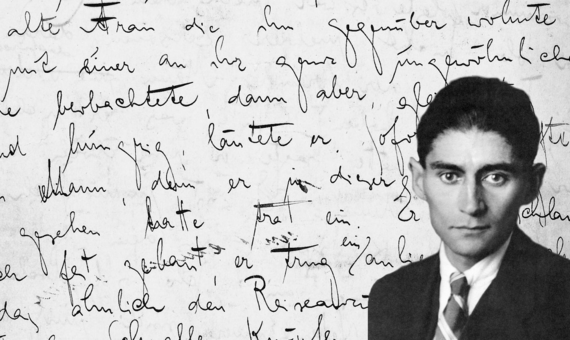Surreal and saturated with themes of isolation and anxiety, Franz Kafka's work has a nightmare-like quality. It comes as little surprise that he suffered from insomnia, wrote mostly at night, and was obsessed with sleep and sleeplessness. In a study published in The Lancet Neurology, Italian doctor Antonio Perciaccante and his coauthor Alessia Coralli take a look at Kafka's life and work through the lens of the literary icon's sleep symptoms.
ResearchGate: What's your professional background?
Antonio Perciaccante: I'm a doctor working in internal medicine at Gorizia Hospital in Italy. Together with my coauthor and wife, Alessia Coralli, I have been interested in the history of medicine and analyzing art through the lens of illness for about two years now.
RG: What caused Franz Kafka's inability to sleep?
Perciaccante: It's difficult to classify Kafka's insomnia. To identify possible causes, we have to look at his lifestyle and mental disorders. Kafka deliberately did most of his intellectual work at night. In his diaries, Kafka himself tries to analyze the causes of his insomnia and speculates: "My insomnia only conceals a great fear of death. Perhaps I am afraid that the soul, which in sleep leaves me, will not be able to return." This hyper-arousal, tendency to worry excessively about sleep, and anxiety suggest that Kafka could have suffered from a psychophysiological insomnia.
RG: How did Kafka's insomnia affect him? Is his experience typical for sufferers of insomnia?
Perciaccante: Insomnia affected both Kafka's life and his literary work. He had a complex, obsessive, and conflicting relationship with sleep. He referred to the night as "my old enemy" to sleep as "the most innocent creature there is and sleepless man the most guilty." Kafka considered insomnia to be a rejection of the natural, and even a sin. But at the same time, he is afraid of sleep, because it represents an area where the consciousness is lost and the contours of his identity are dissolved. Insomnia allows Kafka to write and seek refuge in literature on one hand, but it is not sufficient to placate his demons. In a letter to Milena Jesenská, he tries to explain the relationship between sleep and writing: "Whenever I write to you, sleep is out of the question, both before and after; when I don't write, I at least get a few hours of shallow sleep. When I don't write, I am merely tired, sad, heavy; when I do write, I am torn by fear and anxiety."
How insomnia affects the life of a person is variable and subjective. Some people, such as Franz Kafka, "use" the insomnia for their creative processes.
RG: How did Kafka use his insomnia for his creative process?
Perciaccante: Kafka himself affirmed that writing in a sleep-deprived state provides access to otherwise inaccessible thoughts. He said of the experience, "... how easily everything can be said as if a great fire had been prepared for all these things in which the strangest thoughts emerge and again disappear." Of his own role in the process he remarked, "all I possess are certain powers which, at a depth almost inaccessible at normal conditions, shape themselves into literature."
But, what are these strange thoughts? And what is Kafka's "power" that permits him to access almost inaccessible thoughts? We hypothesize that Kafka referred to hypnagogic hallucinations from which he suffered. In his diaries, he wrote: " ... again it was the power of my dreams, shining forth into wakefulness even before I fall asleep, which did not let me sleep." This seems to be a clear description of a hypnagogic hallucination, a vivid visual hallucination experienced just before the sleep onset.
RG: What evidence of Kafka's insomnia do you see in his literary work?
Perciaccante: Sleep, quality of sleep, and insomnia are central themes in "Metamorphosis." Sleep appears to be both the cause of and solution to Gregor's transformation and alienation. The character's irregular sleep marks the beginning of his dehumanization. Indeed, Gregor finds himself transformed into a vermin after a night of irregular sleep. Insomnia perpetuates this dehumanization, and makes a solution to Gregor's new condition impossible. "Metamorphosis" is a metaphor for social alienation, but we offer an alternative interpretative hypothesis: it may also represent a metaphor for the negative effects that poor quality sleep, short sleep duration, and insomnia may have on mental and physical health.
RG: What sources did you use for this research?
Perciaccante: We used biographical texts about Kafka and literary interpretations of his works. Moreover, Kafka's "Diaries," published posthumously by his friend Max Brod, and correspondence, such as "Letters to Milena" and "Letters to Felice Bauer," were particularly invaluable.
RG: Do you know of other instances of insomnia-inspired art? Would you recommend it as an artistic technique?
Perciaccante: There are of course many examples of insomnia-inspired art, including that of Marcel Proust, Vladimir Nabokov, Emily Bronte, Walt Whitman, and others. I cannot say whether insomnia could be considered an artistic technique, but it is certain that it fed the creative work of some writers.
RG: What value does understanding Kafka's insomnia have for science today?
Perciaccante: It is further confirmation of the association between insomnia and creative work, and should provide further stimulus to study the mechanisms underlying this association.
This interview originally appeared on ResearchGate News.

